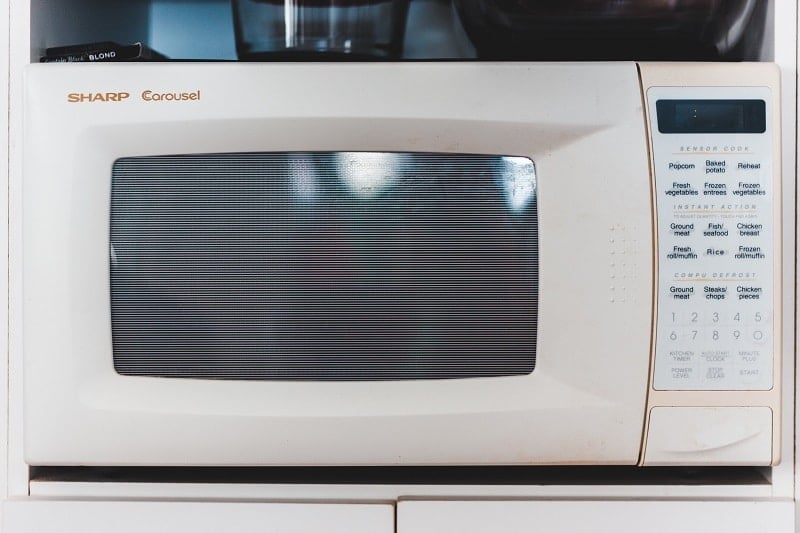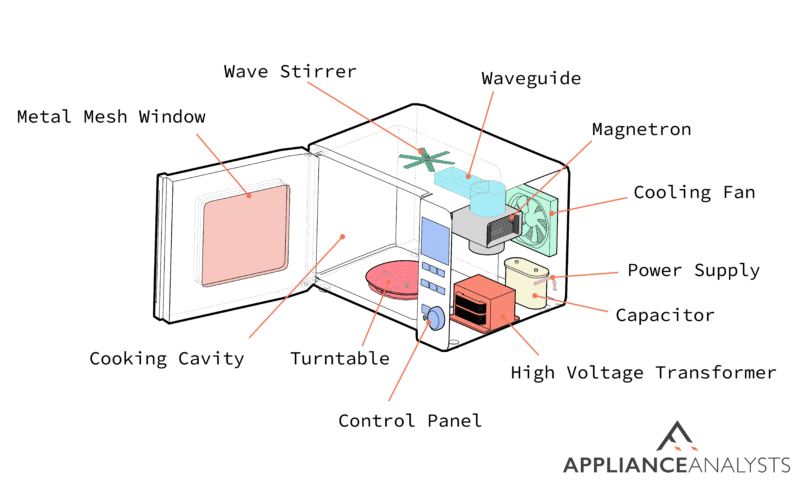The microwave oven disposal process can be very easy, but only if you do it right.
Your first impulse might be just to toss the microwave in the trash. However, throwing your microwave away incorrectly can actually lead to fines in some places!
Disposing of your old microwave safely is important, which is why, in this article, I’ll cover all the approved ways to do so quickly and easily.
Ready? Let’s dive in!
How Best To Dispose Of A Microwave
While it’s illegal in many states to throw microwaves away, there are plenty of good options for microwave oven disposal. Some of the best options include recycling centers, thrift stores, contacting utility companies, and even organizing a trash pickup.
However, there’s more to it than that. Read on, and let’s cover everything you need to know about getting rid of an old microwave.
Where Can You Dispose of a Microwave?
If you’re unable or willing to use a dumpster, that’s ok. I bet there are plenty of places to dispose of your old microwave near you. Look out for:
- Thrift/donation stores: If your old microwave still works, then donate it! Someone else can get some more use out of it before it’s decommissioned for good. Plus, most second-hand stores donate some of their proceeds to charities, so you’re doing good twice.
- Local landfills: Most landfills allow people to dump things directly at the landfill for a small fee. If you’re getting rid of an old microwave but you’re not allowed to use a dumpster, the local landfill is probably your best bet. Depending on the city, most local landfills will have a specific bin for appliances or e-waste.
- Electronic stores: If you have a newer microwave, it will have some fancy circuitry inside. Some electronic stores will take microwaves and recycle them for you in exchange for the metals in the circuits. Check your local stores to see if one near you accepts microwaves.
- Bulk trash pickup days: Most cities have at least once-yearly bulk trash pickup days. On those days, large items like microwaves can be set out along with your normal trash. If a bulk trash day is coming up, that’s a great way to dispose of your microwave.
- Utility companies: If your old microwave is particularly energy-inefficient, your utility company might come to get it from you.
- The manufacturer: If you got your microwave from a well-known brand, you might be able to send it back to them for free. Some appliance manufacturers will even pay shipping costs so they can properly recycle your unit.

During the microwave disposal process, I always advise homeowners to check their local regulations.
Many municipalities have a dimension and weight limit for their curbside garbage pickup. At the same time, others also have separate procedures for picking up electronic waste, which your microwave will most likely be.
Reasons to Dispose of a Microwave
Now that you know different microwave disposal methods, let’s discuss different reasons to get rid of your microwave.
- It’s time for an upgrade. Maybe you’re still using the old microwave that came with the apartment years ago, but the paint has dulled, and it no longer goes along with all the stainless steel pots, pans, and other kitchen appliances you’ve collected. This is a perfectly valid reason to want an upgrade. Just make sure to recycle or donate your perfectly functioning old microwave.
- Microwaves aren’t your thing anymore. Maybe you’re tired of debating the negative health implications of owning a microwave, and you’ve decided to start your new life. One that’s a little freer of electromagnetic radiation. In such cases, please recycle or donate your microwave instead of throwing it out.
- No longer serviceable. Unfortunately, death is unavoidable – even for your microwave. There will come a time when you’ve decided you have no choice but to pull the plug on your microwave. RIP, buddy.
Can You Recycle a Microwave?
I find that recycling is one of the best methods for microwave oven disposal. However, finding a place that will take your old microwave can sometimes be a challenge.
In many places, you can’t just drop your microwave in your recycling bin. Microwaves are complex appliances and require specific processing to separate all the components, so these appliances need to go to specific recycling centers.
When you return your old microwave to the manufacturer or an e-waste disposal company, they usually recycle what they can. If you’re having trouble finding a place to recycle your microwave, check Earth911.com. The Earth911.com website has a search feature to help you find recycling centers to dispose of your microwave near you.
What Stores Accept Old Microwaves?
There are many stores that can help with your microwave oven disposal. There may be a small processing fee, or the stores may take it for free. Finding a store to dispose of your microwave near you can be as simple as finding the nearest big tech or appliance dealer in your area. Stores that accept old microwaves include:
- ApplianceSmart
- Lowes
- Office Depot
- Staples
- General Electric
- Independent appliance repair stores
These companies will take the unit apart, recycle what they can, and properly dispose of the rest.
Can You Throw Away a Microwave in a Dumpster?
It depends. Different cities and counties have different rules for microwave oven disposal. Some cities allow you to toss microwaves into dumpsters as long as you have permission to use the dumpster. Other places consider microwaves “e-waste” or “small appliances” and have special rules.
Your local government should have a website with information on how to toss your old microwave. If your local government doesn’t list microwaves specifically, you can probably toss your microwave in a dumpster.
However, donating or recycling your old microwave is better for the environment and legal everywhere.
If you’re unsure about tossing it, recycle or donate your unit instead.
Is It Safe to Take an Old Microwave Apart?
No, it’s not safe to take a microwave apart.
While it may seem like a standard appliance, microwaves use a lot of electricity, which is then held in a high-voltage capacitor. If not discharged properly, the capacitor can hold on to electricity for days and deliver a lethal shock.
That’s not to say you can’t do it. Just be sure to unplug the microwave and safely discharge the capacitor. Please don’t attempt to discharge the capacitor unless you’re confident in what you’re doing. In my opinion, it’s better to spend some money calling a professional than paying hospital bills in case of an accident!
Another component you have to look out for is the Magnetron. The Magnetron is the unit that generates the electromagnetic waves that cook your food. When the Magnetron is left intact, it’s safe to handle. However, if you take it apart, the Magnetron can release several substances that are dangerous to inhale.

My usual advice for non-technicians is to leave the Magnetron alone. Certified professionals have to undergo long training sessions and pass safety certifications before they can service a Magnetron, si it’s best to leave the job to them.
Are There Any Microwave Parts Worth Selling?
Depending on your microwave, it might contain parts worth selling; however, the scrap value of your microwave as a whole likely isn’t much. On the other hand, individual parts might have value to people looking to repair their units.
Plenty of parts will have replacement part value if you’re scrapping a relatively expensive microwave. Parts with replacement value include:
- Working magnetrons
- Vent fans
- Capacitors
- Keypads
- Turn table trays
An appliance repair store is probably the easiest place to sell replacement parts because they fix microwaves regularly. You can also sell the parts yourself, but it will take time. Your best bet is to either put these replacement parts up on eBay or sell the entire microwave for parts to a dedicated appliance repair specialist.
Conclusion
Getting rid of a microwave can be annoying, but it’s definitely possible. Checking your municipal dump website will give you information on how to dispose of your microwave. You can also take it to companies that offer appliance disposal and recycling.
I hope this article has helped you figure out how to get rid of your old microwave near you.
If this content has made your life easier, please consider supporting us by checking out our other posts and signing up for our mailing list.
Thanks for reading. Have a great day!
-Craig.
Frequently Asked Questions
How Long Do Microwaves Last?
Although many factors are at play, a microwave can last up to 10 years when maintained properly!
This will depend on how often you service it, how long you wait before looking into repairs when something goes wrong, and how well you use the microwave.
How to Know When to Repair and When to Replace a Microwave?
There’s no cookie-cutter answer to the question above, as it can depend on many things. If your microwave is nearing a decade old, repairs will likely cost more than a new one.
My usual advice is to never spend in repairs more than 50% of the price of a new microwave with similar features.
How to Properly Prepare a Microwave for Disposal?
The hardest part of preparing for microwave oven disposal is finding where to drop it off. Once you know that, the rest is really easy. Here are some simple steps you’ll want to follow:
1. Unplug the microwave and clean it.
2. Remove trays, dishes, and other “loose” parts.
3. Secure the microwave door by taping it shut.
4. Hand the microwave over to the nearest recycling/disposal center.
That’s it!







